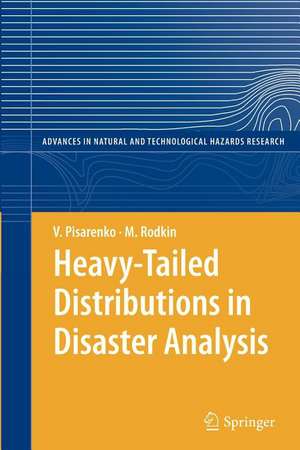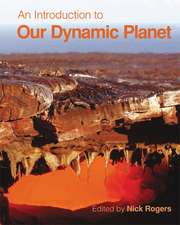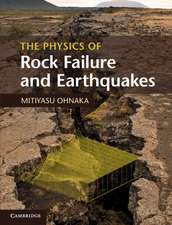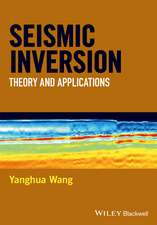Heavy-Tailed Distributions in Disaster Analysis: Advances in Natural and Technological Hazards Research, cartea 30
Autor V. Pisarenko, M. Rodkinen Limba Engleză Paperback – 13 oct 2012
The results obtained argue for sustainable development, whereas entirely different, incorrect conclusions can be drawn if the specific properties of the heavy-tailed distribution and change in completeness of data on natural hazards are neglected.
This pioneering work is directed at risk assessment specialists in general, seismologists, administrators and all those interested in natural disasters and their impact on society.
| Toate formatele și edițiile | Preț | Express |
|---|---|---|
| Paperback (1) | 635.96 lei 6-8 săpt. | |
| SPRINGER NETHERLANDS – 13 oct 2012 | 635.96 lei 6-8 săpt. | |
| Hardback (1) | 642.18 lei 6-8 săpt. | |
| SPRINGER NETHERLANDS – 2 aug 2010 | 642.18 lei 6-8 săpt. |
Din seria Advances in Natural and Technological Hazards Research
- 18%
 Preț: 977.97 lei
Preț: 977.97 lei - 18%
 Preț: 921.15 lei
Preț: 921.15 lei - 18%
 Preț: 1406.35 lei
Preț: 1406.35 lei - 18%
 Preț: 788.72 lei
Preț: 788.72 lei - 15%
 Preț: 643.84 lei
Preț: 643.84 lei - 18%
 Preț: 955.56 lei
Preț: 955.56 lei - 18%
 Preț: 954.31 lei
Preț: 954.31 lei - 18%
 Preț: 958.56 lei
Preț: 958.56 lei - 18%
 Preț: 937.56 lei
Preț: 937.56 lei - 18%
 Preț: 952.72 lei
Preț: 952.72 lei -
 Preț: 382.18 lei
Preț: 382.18 lei - 15%
 Preț: 647.92 lei
Preț: 647.92 lei - 18%
 Preț: 948.47 lei
Preț: 948.47 lei - 15%
 Preț: 640.06 lei
Preț: 640.06 lei -
 Preț: 407.01 lei
Preț: 407.01 lei - 15%
![Submarine Mass Movements and Their Consequences [With CDROM]](https://i4.books-express.ro/bs/9781402012440/submarine-mass-movements-and-their-consequences-with-cdrom.jpg) Preț: 604.37 lei
Preț: 604.37 lei - 15%
 Preț: 643.48 lei
Preț: 643.48 lei - 15%
 Preț: 648.05 lei
Preț: 648.05 lei - 18%
 Preț: 1236.99 lei
Preț: 1236.99 lei - 18%
 Preț: 947.35 lei
Preț: 947.35 lei - 18%
 Preț: 947.35 lei
Preț: 947.35 lei - 18%
 Preț: 966.15 lei
Preț: 966.15 lei - 15%
 Preț: 642.51 lei
Preț: 642.51 lei - 18%
 Preț: 951.29 lei
Preț: 951.29 lei - 18%
 Preț: 1255.16 lei
Preț: 1255.16 lei - 15%
 Preț: 642.51 lei
Preț: 642.51 lei - 15%
 Preț: 646.43 lei
Preț: 646.43 lei - 18%
 Preț: 1244.08 lei
Preț: 1244.08 lei
Preț: 635.96 lei
Preț vechi: 748.20 lei
-15% Nou
Puncte Express: 954
Preț estimativ în valută:
121.71€ • 126.59$ • 100.48£
121.71€ • 126.59$ • 100.48£
Carte tipărită la comandă
Livrare economică 14-28 aprilie
Preluare comenzi: 021 569.72.76
Specificații
ISBN-13: 9789400732858
ISBN-10: 9400732856
Pagini: 190
Ilustrații: XIV, 190 p.
Dimensiuni: 155 x 235 x 11 mm
Greutate: 0.3 kg
Ediția:2010
Editura: SPRINGER NETHERLANDS
Colecția Springer
Seria Advances in Natural and Technological Hazards Research
Locul publicării:Dordrecht, Netherlands
ISBN-10: 9400732856
Pagini: 190
Ilustrații: XIV, 190 p.
Dimensiuni: 155 x 235 x 11 mm
Greutate: 0.3 kg
Ediția:2010
Editura: SPRINGER NETHERLANDS
Colecția Springer
Seria Advances in Natural and Technological Hazards Research
Locul publicării:Dordrecht, Netherlands
Public țintă
ResearchCuprins
Distributions of Characteristics of Natural Disasters: Data and Classification.- Models for the Generation of Distributions of Different Types.- Nonparametric Methods in the Study of Distributions.- Nonlinear and Linear Growth of Cumulative Effects of Natural Disasters.- The Nonlinear and Linear Modes of Growth of the Cumulative Seismic Moment.- Estimating the Uppermost Tail of a Distribution.- Relationship Between Earthquake Losses and Social and Economic Situation.
Recenzii
From the reviews:
“This book is, therefore, timely and should be welcomed by those working in earthquake forecasting … . an important reference text that should be useful to those seeking to estimate loss and quantify probabilities of rare events using the conventional approach of nipping and tucking the seismic database to the Poissonian figure. Those seeking to model the real Earth seismic expression may also find it a useful start point.” (Joan L. Latchman, Mathematical Geosciences, Vol. 43, 2011)
“This book is, therefore, timely and should be welcomed by those working in earthquake forecasting … . an important reference text that should be useful to those seeking to estimate loss and quantify probabilities of rare events using the conventional approach of nipping and tucking the seismic database to the Poissonian figure. Those seeking to model the real Earth seismic expression may also find it a useful start point.” (Joan L. Latchman, Mathematical Geosciences, Vol. 43, 2011)
Textul de pe ultima copertă
Mathematically, natural disasters of all types are characterized by heavy tailed distributions. The analysis of such distributions with common methods, such as averages and dispersions, can therefore lead to erroneous conclusions. The statistical methods described in this book avoid such pitfalls. Seismic disasters are studied, primarily thanks to the availability of an ample statistical database. New approaches are presented to seismic risk estimation and forecasting the damage caused by earthquakes, ranging from typical, moderate events to very rare, extreme disasters. Analysis of these latter events is based on the limit theorems of probability and the duality of the generalized Pareto distribution and generalized extreme value distribution. It is shown that the parameter most widely used to estimate seismic risk – Mmax, the maximum possible earthquake value – is potentially non-robust. Robust analogues of this parameter are suggested and calculated for some seismic catalogues. Trends in the costs inferred by damage from natural disasters as related to changing social and economic situations are examined for different regions. The results obtained argue for sustainable development, whereas entirely different, incorrect conclusions can be drawn if the specific properties of the heavy-tailed distribution and change in completeness of data on natural hazards are neglected.Audience:This pioneering work is directed at risk assessment specialists in general, seismologists, administrators and all those interested in natural disasters and their impact on society.
Caracteristici
Mathematical evidence of non-robustness of Mmax parameter are presented Robust analog of Mmax is presented Evidence in support of possible realization of sustainable development is presented Distribution laws typical for natural disasters are examined Includes supplementary material: sn.pub/extras










